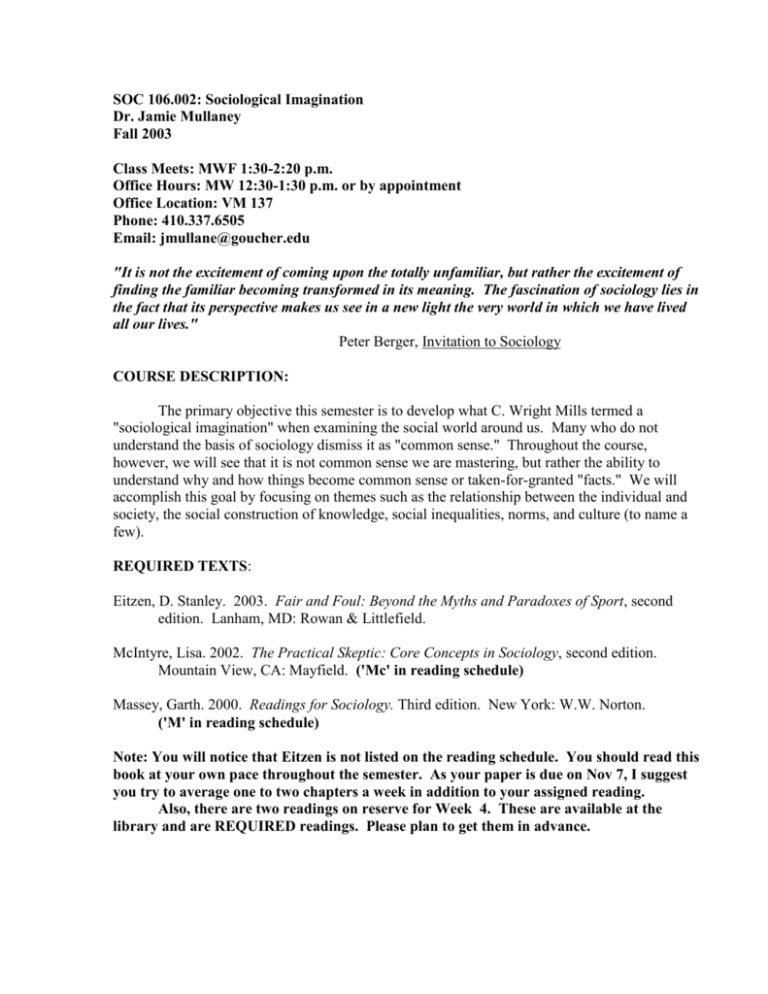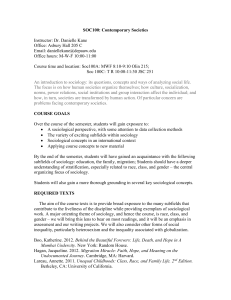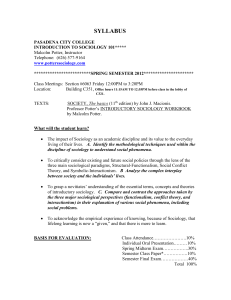SOC 106 - Nerdland User Pages
advertisement

SOC 106.002: Sociological Imagination
Dr. Jamie Mullaney
Fall 2003
Class Meets: MWF 1:30-2:20 p.m.
Office Hours: MW 12:30-1:30 p.m. or by appointment
Office Location: VM 137
Phone: 410.337.6505
Email: jmullane@goucher.edu
"It is not the excitement of coming upon the totally unfamiliar, but rather the excitement of
finding the familiar becoming transformed in its meaning. The fascination of sociology lies in
the fact that its perspective makes us see in a new light the very world in which we have lived
all our lives."
Peter Berger, Invitation to Sociology
COURSE DESCRIPTION:
The primary objective this semester is to develop what C. Wright Mills termed a
"sociological imagination" when examining the social world around us. Many who do not
understand the basis of sociology dismiss it as "common sense." Throughout the course,
however, we will see that it is not common sense we are mastering, but rather the ability to
understand why and how things become common sense or taken-for-granted "facts." We will
accomplish this goal by focusing on themes such as the relationship between the individual and
society, the social construction of knowledge, social inequalities, norms, and culture (to name a
few).
REQUIRED TEXTS:
Eitzen, D. Stanley. 2003. Fair and Foul: Beyond the Myths and Paradoxes of Sport, second
edition. Lanham, MD: Rowan & Littlefield.
McIntyre, Lisa. 2002. The Practical Skeptic: Core Concepts in Sociology, second edition.
Mountain View, CA: Mayfield. ('Mc' in reading schedule)
Massey, Garth. 2000. Readings for Sociology. Third edition. New York: W.W. Norton.
('M' in reading schedule)
Note: You will notice that Eitzen is not listed on the reading schedule. You should read this
book at your own pace throughout the semester. As your paper is due on Nov 7, I suggest
you try to average one to two chapters a week in addition to your assigned reading.
Also, there are two readings on reserve for Week 4. These are available at the
library and are REQUIRED readings. Please plan to get them in advance.
COURSE REQUIREMENTS:
Your final grade will be determined by the following 500-point scale:
Weekly Discussion Questions (11 x 10 points each)
Group Exercises
Problem-Based Learning Project
Fair & Foul Synthesis Paper (due Fri, Nov 7)
Facilitation of Class Discussion
Attendance & Participation
110 points
100 points
100 points
100 points
40 points
50 points
EXPECTATIONS AND GUIDELINES:
1. You will be held to the standards of academic integrity as stated by Goucher College. If you
come to class, participate, and do the readings, you eliminate both the 'need' and the temptation to
cheat. I will NOT tolerate cheating of any sort. If I suspect you are cheating at any point during
the semester, I will report it IMMEDIATELY.
2. I am replacing exams with discussion questions this semester. I expect you to complete the
readings each week and write thoughtful questions in response to them. (See attached
guidelines.) I will drop the lowest score at the end of the semester; however, you should take this
component of your grade seriously, as it makes up over 20% of your final grade. Failing to read
also means being unable to participate in class discussions, which will affect your participation
grade. If the quality of these questions drops at any point during the semester, I reserve the
right to revise the syllabus and add exams.
3. Late discussion questions will NOT be accepted—absolutely no exceptions. As we are
discussing the week’s readings in class, it is not fair to your classmates if you are able to submit a
paper subsequent to the class meeting. Discussion questions are due in class every Friday. If you
must miss class on a Friday, this deadline still stands.
4. You will work in pre-assigned groups throughout the semester. You will sign a group contract
designed by your group as a whole. This contract will establish the rules and expectations for
your group for the semester. In addition to in-class exercises, your group will complete a large,
collaborative final project.
5. I will drop the lowest group work when calculating your final average. Please do not bring
doctor's notes, car repair bills, etc. as an excuse for missing a group activity. You are allowed one
"free pass." With that said, don't waste this freebie early in the semester.
6. I am eliminating pop quizzes that were previously a part of the requirements and adding
attendance and participation. I will take attendance each time we meet. Two absences will go
unquestioned. After that I will deduct 10 points from your attendance grade for each absence.
Missing ten or more classes will result in failure of the course. Sleeping in class counts as an
absence.
TOPICS AND READING SCHEDULE:
NOT SOCIAL WORK, PSYCHOLOGY, OR COMMON SENSE:
UNDERSTANDING SOCIOLOGY
Week 1: September 3/5
No reading; buy your books!!
JUST THE FACTS, MA'AM?: THE SOCIAL CONSTRUCTION OF KNOWLEDGE
Week 2: September 8/10/12
(M, #1) Berger, "What Are Sociologists and Why Are they Doing This?"
(M, #20) Mantsios, "Media Magic: Making Class Invisible"
(M, #24) Eitzen, "Upward Mobility Through Sport?"
WHO HAS CULTURE? WE ALL DO!
Week 3: September 15/17/19
(Mc, ch. 4) "Who's Afraid of Sociology?"
(Mc, ch. 7) "Culture"
(M, #10) Kluckholm, "Queer Customs"
UNDER THE INFLUENCE: THE INDIVIDUAL AND SOCIETY
Week 4: September 22/24/26
(reserve) Haney, Banks, & Zimbardo, “A Study of Prisoners and Guards in a Simulated
Prison”
(reserve) Osherow, “Making Sense of the Nonsensical: An Analysis of Jonestown”
(M, #3) Durkheim, "What Is a Social Fact?"
ME, MYSELF, AND I: SOCIALIZATION AND THE CONSTRUCTION OF SELF
Week 5: September 29/ October 1/3
(Mc, ch. 10) "Socialization"
(M, #29) Sidel, "Mixed Messages"
(M, #30) Messner, "Masculinities and Athletic Careers"
ALL SOCIOLOGISTS ARE NOT ALIKE: SOCIOLOGICAL THEORY
Week 6: October 6/8/10
(Mc, ch. 1) "Responding to Chaos: A Brief History of Sociology"
(Mc, ch. 3) "Science and Fuzzy Objects: Specialization in Sociology"
Week 7: October 13/15
(M, #6) Gans, "The Positive Functions of the Undeserving Poor..."
(M, #19) Marx & Engels, "Manifesto of the Communist Party"
(M, #33) Weber, From The Protestant Ethic
Mid-semester Break: No Class October 17 and 20
A METHOD TO THE MADNESS: DOING SOCIAL RESEARCH
Week 8: October 22/24
(Mc, ch. 5) "The Vocabulary of Science"
(Mc, ch. 6) "Doing Social Research"
(M, #7) Polsky, "The World of Pool Hustling"
(M, #8) Brandt, "Racism and Research: The Case of the Tuskegee Syphilis Study"
"NO ONE LIKES A FELLA WITH A SOCIAL DISEASE": DEFINING DEVIANCE
Week 9: October 27/29/31
(Mc, ch. 11) "Deviance and Social Control"
(M, #18) Chambliss, "The Saints and the Roughnecks"
Week 10: November 3/5/7
No readings this week; spend the extra time finishing Fair and Foul paper.
"THE RICH GET RICHER" AND OTHER STORIES OF SOCIAL STRATIFICATION
Week 11: November 10/12/14
(Mc, ch. 13) "Inequality and Achievement: Social Class"
(M, #42) Kozol, "Savage Inequalities"
(M, #43) MacLeod, "School and the Reproduction of Social Class"
Week 12: November 17/19/21
(Mc, ch. 14) "Inequality and Ascription: Race, Ethnicity, and Gender"
(M, #28) Ruth, "Women's Personal Lives: The Effects of Sexism on Self and Relationships"
Week 13: November 24
Short Week; No Reading; Project Wrap-up if Necessary
Thanksgiving Break: No Class November 26 and 28
GETTING INSTITUTIONALIZED: SOCIAL STRUCTURE AND EVERYDAY LIFE
Week 14: December 1/3/5
(Mc, ch. 9) "Society and Social Institutions"
(M, #34) Ritzer, "The McDonald's System"
Week 15: December 8/10
(M, #40) Stack, “Domestic Networks”
(M, #41) Hochschild, “The Emotional Geography of Work and Family”






